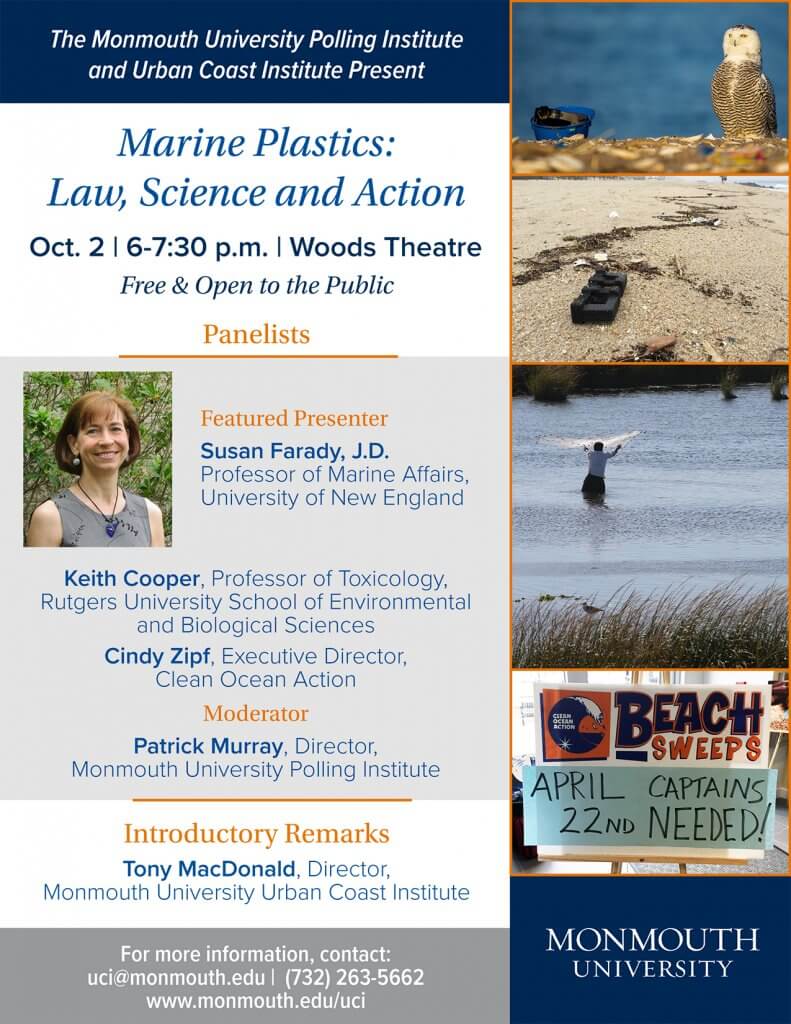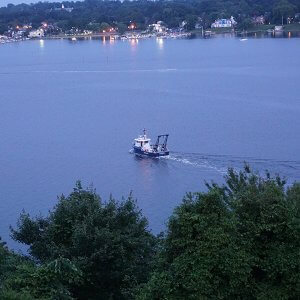Nearing Anniversary of Sandy, Residents Invited to Post their Stories to Gallery Wall
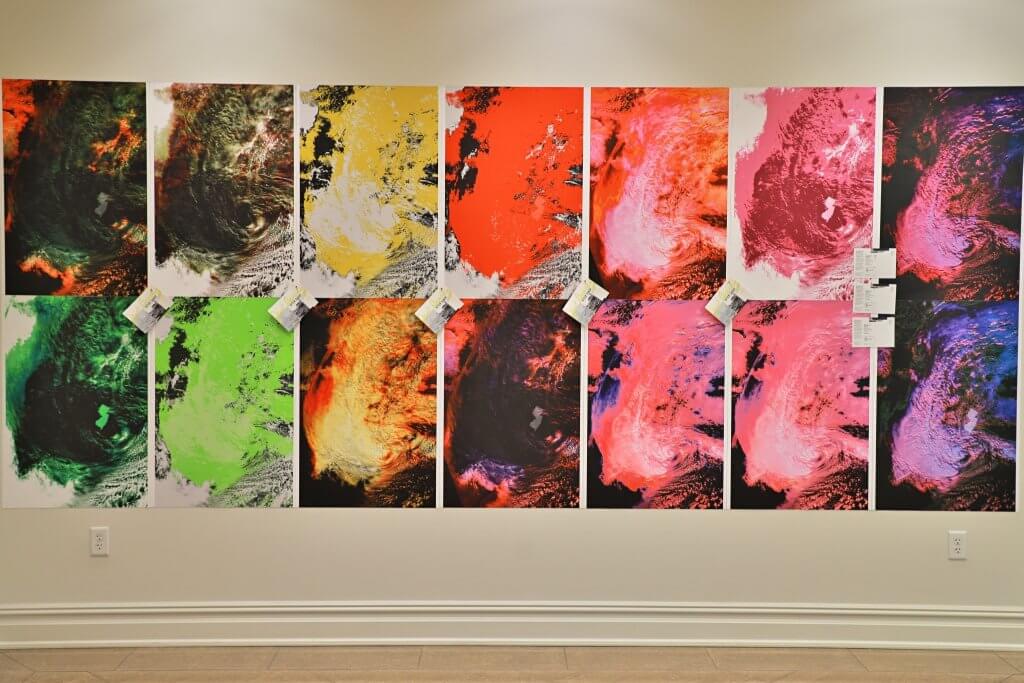
With the seventh anniversary of Superstorm Sandy approaching, a new exhibition at Monmouth University captures the destructive force of the storm and the mounting threats of climate change and sea level rise through abstract and participatory works of art. Free and open to the public, the exhibition encourages residents who were impacted by Sandy to contribute to the installation by sharing their memories on a special wall adorned with satellite imagery of the storm.
 “Just Beachy/After Sandy,” featuring the work of Monmouth University Department of Art and Design Professor Karen Bright and Assistant Professor of Communication Amanda Stojanov, can be viewed through Dec. 9 at the DiMattio Gallery, located in Rechnitz Hall. Some of the exhibition’s highlights include:
“Just Beachy/After Sandy,” featuring the work of Monmouth University Department of Art and Design Professor Karen Bright and Assistant Professor of Communication Amanda Stojanov, can be viewed through Dec. 9 at the DiMattio Gallery, located in Rechnitz Hall. Some of the exhibition’s highlights include:
- The Drying Station: Nearly a century of scientific data for natural phenomena such as high tide levels, wave heights and wind speeds on the Jersey Shore are interpreted by Bright in the form of beach towel designs. The towel panels hang in an arrangement that allows visitors to walk among and between them.
- 9 Feet High: Those who endured Sandy can “erase” the storm by covering up this wall of NASA satellite images with their hand-written stories. The colorful prints were designed by Bright with production assistance by Stojanov.
- The Climate Shelter: Visitors can step into a personal-sized, geodesic-domed shelter to hear and view a digital media interpretation, “Hurricane,” created by Stojanov. The outside is decorated with prints and paintings by Bright – representing a world turned inside out – requiring a new way of thinking about climate and the effects of global warming.
- The Transformer: At over 10 feet high, this information graphic in the form of a sculpture visualizes the massive number of housing units that were lost in New Jersey and New York as a result of Sandy. Bright’s sculpture is composed of stacked tree rounds topped by two bird houses fashioned to look like green Monopoly game houses, which are sized to mathematically represent the number of lost homes. A sandbox at its base offers visitors a chance to rake or bury a small relic from their Sandy experience, or just provide a moment of release.
“The driving intent for ‘Just Beachy/After Sandy’ is to reach out to people through action,” Bright said. “The installation offers visitors the chance to share their personal stories and release them to the wall, contemplate while raking or digging sand, hear and view a media interpretation of Sandy while sitting in a quite space, and learn while walking through a maze of hanging panels. The hope is that by bringing the community together, people will find personal relief through shared experience.”
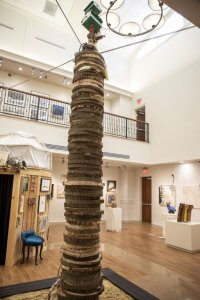 Two complementary exhibitions led by Bright will also debut on Sept. 20. “Karen Bright―Throughline,” also at the DiMattio Gallery, features four decades of the artist’s works centered on the environment as well as prevalent social and cultural issues such as the #MeToo movement and politics. ”A Sense of Place in Contemporary Encaustic,” at the neighboring Ice House Gallery, features 24 artists’ works that provide interpretations of space, ranging from serene landscapes to the abstract.
Two complementary exhibitions led by Bright will also debut on Sept. 20. “Karen Bright―Throughline,” also at the DiMattio Gallery, features four decades of the artist’s works centered on the environment as well as prevalent social and cultural issues such as the #MeToo movement and politics. ”A Sense of Place in Contemporary Encaustic,” at the neighboring Ice House Gallery, features 24 artists’ works that provide interpretations of space, ranging from serene landscapes to the abstract.
The exhibitions are open for public viewing during standard gallery hours of 10 a.m. to 5 p.m. Monday-Friday and 10 a.m. to 4 p.m. on weekends.
The exhibitions are also part of the Monmouth University Center for the Arts 2019-2020 season. “Just Beachy/After Sandy” was funded in part by the Monmouth University Urban Coast Institute. For more information, visit www.monmouth.edu/mca.
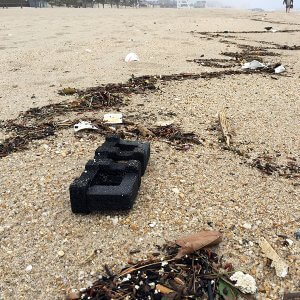 Most New Jerseyans initially support a single-use plastic bag ban, but many back away from that support when considering the impact on consumer shopping habits, according to a Monmouth University Poll conducted in partnership with the Urban Coast Institute (UCI). The vast majority of Garden State residents say that ocean pollution caused by plastics is a serious problem, but few have heard much about the issue of microplastics in the environment.
Most New Jerseyans initially support a single-use plastic bag ban, but many back away from that support when considering the impact on consumer shopping habits, according to a Monmouth University Poll conducted in partnership with the Urban Coast Institute (UCI). The vast majority of Garden State residents say that ocean pollution caused by plastics is a serious problem, but few have heard much about the issue of microplastics in the environment.
 Rechnitz Family UCI Endowed Chair in Marine and Environmental Law and Policy Randall S. Abate drafted an article in the summer 2019 issue of the
Rechnitz Family UCI Endowed Chair in Marine and Environmental Law and Policy Randall S. Abate drafted an article in the summer 2019 issue of the 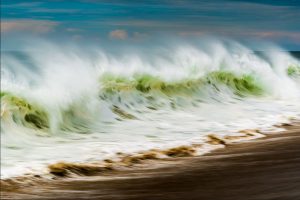 Monmouth University students can apply for a number of paid positions conducting door-to-door surveys for select coastal towns in the Raritan Bay area and Monmouth County through the Institute for Sustainable Cities (ISC) at Hunter College and Consortium for Climate Risk in the Urban Northeast (CCRUN). The surveys will pertain to community and household coastal adaptation to sea-level rise, coastal storms, and nuisance flooding along with local development trends. The survey aims to determine how the perception of future sea level rise is influencing coastal homeowners’ decision-making and gauge their needs for further information pertaining to flood mitigation, including what local and state municipalities can do to propagate and assist local resiliency efforts. The desired outcome is to figure out the decision frames that households are using to address questions of increasing climate risk along with their risk tolerance to differing levels of flooding and what metrics they use to measure risk.
Monmouth University students can apply for a number of paid positions conducting door-to-door surveys for select coastal towns in the Raritan Bay area and Monmouth County through the Institute for Sustainable Cities (ISC) at Hunter College and Consortium for Climate Risk in the Urban Northeast (CCRUN). The surveys will pertain to community and household coastal adaptation to sea-level rise, coastal storms, and nuisance flooding along with local development trends. The survey aims to determine how the perception of future sea level rise is influencing coastal homeowners’ decision-making and gauge their needs for further information pertaining to flood mitigation, including what local and state municipalities can do to propagate and assist local resiliency efforts. The desired outcome is to figure out the decision frames that households are using to address questions of increasing climate risk along with their risk tolerance to differing levels of flooding and what metrics they use to measure risk.
 “Just Beachy/After Sandy,” featuring the work of Monmouth University Department of Art and Design Professor Karen Bright and Assistant Professor of Communication Amanda Stojanov, can be viewed through Dec. 9 at the DiMattio Gallery, located in Rechnitz Hall. Some of the exhibition’s highlights include:
“Just Beachy/After Sandy,” featuring the work of Monmouth University Department of Art and Design Professor Karen Bright and Assistant Professor of Communication Amanda Stojanov, can be viewed through Dec. 9 at the DiMattio Gallery, located in Rechnitz Hall. Some of the exhibition’s highlights include: Two complementary exhibitions led by Bright will also debut on Sept. 20. “Karen Bright―Throughline,” also at the DiMattio Gallery, features four decades of the artist’s works centered on the environment as well as prevalent social and cultural issues such as the #MeToo movement and politics. ”A Sense of Place in Contemporary Encaustic,” at the neighboring Ice House Gallery, features 24 artists’ works that provide interpretations of space, ranging from serene landscapes to the abstract.
Two complementary exhibitions led by Bright will also debut on Sept. 20. “Karen Bright―Throughline,” also at the DiMattio Gallery, features four decades of the artist’s works centered on the environment as well as prevalent social and cultural issues such as the #MeToo movement and politics. ”A Sense of Place in Contemporary Encaustic,” at the neighboring Ice House Gallery, features 24 artists’ works that provide interpretations of space, ranging from serene landscapes to the abstract.